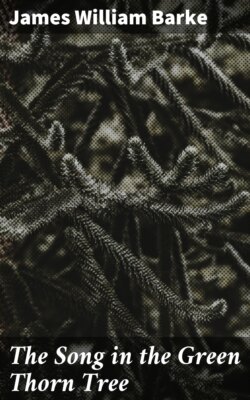Читать книгу The Song in the Green Thorn Tree - James William Barke - Страница 8
На сайте Литреса книга снята с продажи.
THE BENMOST BORE
ОглавлениеTable of Contents
Gulls swarmed behind the plough; rooks followed a safe distance behind; lapwings tossed and tumbled and beat above the ponies’ heads. Robert Allan, a cousin from Old Rome Forest near Kilmarnock, led the horses; Willie Patrick, the eight years old herd-boy, was brisk with his pointed wooden gaud to see that the beasts pulled evenly on the traces; Robert Burns was doubled between the plough-stilts.
It had turned a fine morning after some early rain and despite the chill wind that blew across the wide valley of the River Ayr. The valley dipped from the bare exposed ridge of Mossgiel farm and rose, far on the other side, to the soft slopes of the Dalmellington hills whose outlines stood clear against the cold sky. The hills themselves lay in pools of colour: grey-blue, dun and black, with bright patchwork depressions of drifted snow. The oblique sunlight sharpened the spurs and ridges in glittering light.
In the grey-green valley patches of gorse, whin and shrub mottled the landscape. The woodland and shaws, especially along the river’s banks, were black and gold, while here and there (escaping the gilding sun’s rays) a solitary tree raised the frozen ecstasy of its ebony arms.
It was a glorious scene, cold and clean-cut in its scars but caressing in its swelling contours. Nowhere else in Kyle, Cunninghame or Carrick was there to be found an equal prospect where vista merged into vista; where the eye lingeringly caressed the sweep of its own vision and no ugliness of man or of nature obtruded to mar or to blemish.
Coming down the slant of the ridge Robin would raise his eyes from the furrow and take in a sweep of the scene. It cooled his mind and strengthened his spirit.
But the cooling of his mind only served to harden its temper. Out of the memory-mist of Poosie Nancie’s the images began to separate and sharpen, only to be sucked down again into the noise and clatter, the smoke and smells, the riot and dissipation of the evening.
Sometimes he saw himself sitting there with Jamie Smith on a box-seat on the far side of the fire while in the centre of the floor the gangrels danced and leapt and cursed and swore, wept and laughed and cried.
And then to a fiddler’s scraping, and filled with an exultation not unmixed with Johnnie Pigeon’s whisky, he had joined in a reel with a couple of tinkler-jads, linking up and down the floor with an arm in either oxter.
The songs he had heard, the scraps of tales; the slack-mouthed whore with the ready wit; the mixty-maxty muddle of uproarious merriment (with Black Geordie Gibson himself coming in threatening to throw one and all in the dung-midden if they didn’t keep quiet)...
And the last scene with all of them lying heads and thraws on the floor, exhausted, drunk, asleep or making love; with Geordie’s serving-jurr, Nancy Wilson, creeping in to lay herself down beside the sailor whose ears had been cut off by the Algerian pirates, but who doubtless had enough placks in his pocket to pay for Nancy’s caresses!
Raise his eyes to the distant hills as he might, he could not rid his mind of the scene...
But gradually the frenzied riot of images quietened down and he began to impose an order on them. He began to extricate individuals from the mass; he was able to hold an individual in outline and hold the image static; to fill in the outline; to move the figure to his own rhythm; to rationalise the words; give them coherence, point and form; to cut away all the ragged and blurred edges; to geal the flux and then mould it; to establish a memorable rhythm; to press into a pattern...
And only when he set his characters in the round and heard the beat of the measure did the scene reanimate itself. And then words came with his thoughts and line tumbled and trembled on line as the thoughts were word-symbolised. The howff became intellectually efflorescent... Even the light in the gimlet eyes of the frightened rat, in its backward glance, outshone the light of the noonday sun until the benmost bore of his creative faculty could yield no more...
“By God, Robin,” said his cousin, “I never kenned you plough to better measure.”
Robin dragged off his bonnet and dried the sweat from his face.
“Man, Bob, I could drive a furrow frae Mossgiel to Montgomerie’s and never look over my shoulder: I could tear up the clods wi’ my bare hands.”
“By certes, it must be grand stuff that o’ Johnnie Dow’s.”
“Dow’s my foot! Rab Burns has a spirit that’s no’ to be bought in ony howff; and the still’s up here.”
He tapped his forehead. But to Bob Allan he might have been talking Greek.
